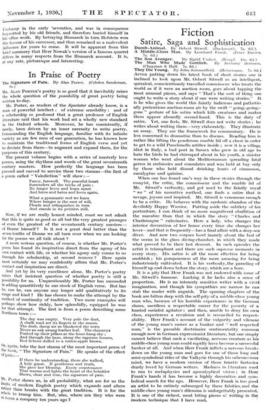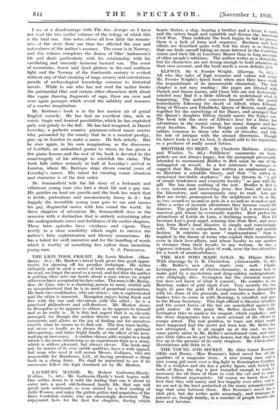Fiction
Satire, Saga and Sophistication
They Die Young. By John Sommerfieid. (Heinemann. 7s. 6d.) AFTER putting down his latest book of short stories one is inclined to look upon Mr. Osbert Sitwell as an intelligent, quizzical, conscientiously travelled connoisseur who treats the
world as if it were an auction room, goes about tapping the most unusual pieces, and says " That's the sort of thing one ought to write a story about if one were writing stories." It is he who gives the world this faintly ludicrous and pathetic-, ally pretentious auction-room air by the swift " going,-going,- gone " gesture of his satire which kills creatures and makes them appear absurdly second-hand. This is the duty of satire. Yet, one feels, Mr. Sitwell does not write stories ; he writes about writing them—very elaborately. They illustrate an essay. They are the framework for commentary. He is less concerned to dramatise than to discuss. Reading him is rather like lifting the ponderous marble lid off a chest in order to get to a wild Punchinello artifice inside ; now it is a village idiot in Italy, a bad poet in Sussex who grew in old age to hate the birds he had chirruped about in his youth, a sinister woman who went about the Mediterranean spreading fatal germs in embassies and consulates and was held at bay only by those who held dismal drinking bouts of cinnamon, eucalyptus and quinine.
When one has found one's way in these stories through the essayist, the critic, the connoisseur and the marble lid of Mr. Sitwell's verbosity, and got used to the faintly royal " we " of his narrative method, one finds a satire that is savage, joyous and inspired. Mr. Sitwell is venomous enough to be a critic. He behaves with the sardonic abandon of the devilishly Happy Warrior. Putting aside the subtlety of his portraiture, I can think of no more magnificent ebullition of the macabre than that in which the story " Charles and Charlemagne " culminates. Here a lady, who changes the .interior decoration of her house every time she changes her lover—and that is frequently—has a final affair with a deep-sea diver. And now two corpses bowl inanely about the bed of the ocean in the glass diving-chamber, in which they made what proved to be their last descent. In such episodes the artist is triumphant and there are such supreme moments in every story. His satire is all the more effective for being snobbish ; his pompousness all the more amusing for being industriously cultivated. It is his verbosity, the parading of himself up end down before the story, which are a bore.
• It is a pity that Herr Frank was not endowed with sonic of Mr. Sitwell's humour. Lacking it he lacks also a sense of proportion. He is an intensely sensitive writer with a vivid imagination, and though his sympathies are narrow he can stab the reader with anguish. The opening chapters of the book are bitten deep with the self-pity of a middle-class young man who, because of his horrible experiences in the German slums, sacrifices a respectable career for the poverty of a hunted socialist agitator ; and then, unable to deny his own class, experiences a revulsion and is reconciled to respect- ability. Herr Frank's account of the vulgarity and vilenesS of the young man's career as a banker and " well respected Man," is the passable doctrinaire sentimentality common enough now in German expressionist literature, but one simply cannot believe that such a vacillating, nervous creature as his middle-class young man could rapidly have become a successful banker at all. And when Herr Frank inflicts a nervous break: down on the young man and goes for one of those long and semi-symbolical rides of the Valkyrie through his subconscious mind, we have a modern version of those lunatic fantasies dearly loved by German writers. Madness. in .ffierature used to run to metaphysics and apocalyptical vision ; in Herr Frank's hands it has become a highly decorative and spa.: bolical search for the ego. However, Herr Frank is too good an artist to be entirely submerged by these falsities, and the Middle-class young man's dilemma is unforgettably presented. It is one of the richest, most biting pieces o: writing in the Modern_ technique that I have read. I am at a disadvantage with The Son Avenger as I have not read the two earlier volumes of the trilogy of which this is the final one. One notes above all how little the remote- ness of the story from our time has affected the ease and naturalness of the author's manner. The scene is in Norway, and this volume completes the drama of Olav Audonsson's life and deals particularly with his relationship with his N:acillating and sincerely insincere bastard son. The scene of mountains, forest and fjord glistens in the cool northern light, and the Norway of the fourteenth century is evoked Without any of that creaking of stage scenery and ostentatious parade of archaeological knowledge common to historical novels. While to one who has not read the earlier books the patriarchal Olav and certain other characters drift about like vague thawing fragments of saga, there are over and over again passages which reveal the subtlety and resource of a master imagination.
Mr. Bertram's book is in the less austere air of genial English comedy. He has had an excellent idea, rich in comic, tragic and ironical possibilities,which he has exploited gaily and grimly to the full. He has had imagined, in Daniel Loveday, a pathetic country grammar-school music master who, persuaded by the county that he is a musical prodigy, goes tip to London to make a name. He fails utterly. But he rises again, in his own imagination, as the discoverer of Gottlieb, an undoubted genius to whom he has given a few piano lessons,and the rest of the book is devoted to the comi-tragedy of his attempt to establish the claim. The book falls rather seriously in half at Loveday's arrival in London, where Mr. Bertram skips eleven crucial years of Loveday's career. His talent for creating comic situation and character is of the first order.
Mr. Sommerfield tells the life story of a fortunate and villainous young man who had a short life and a gay one. His gaieties on land are puerile,and the book has much that is feeble, pretentious and unconsciously funny in it : but happily the incredible young man goes to sea and carries his gay, disgraceful career with him round the world. In these chapters of adventure Mr. Sommerfield rises to the occasion with a distinction that is entirely astonishing after the undergraduate ennui and feebleness of the earlier chapters. These later episodes have vividness and vigour. They testify to a clear sensibility which ought to survive the author's false sophistication and literary mannerisms. He has a talent for swift narrative and for the handling of words which is worthy of something less callow than incredible











































 Previous page
Previous page